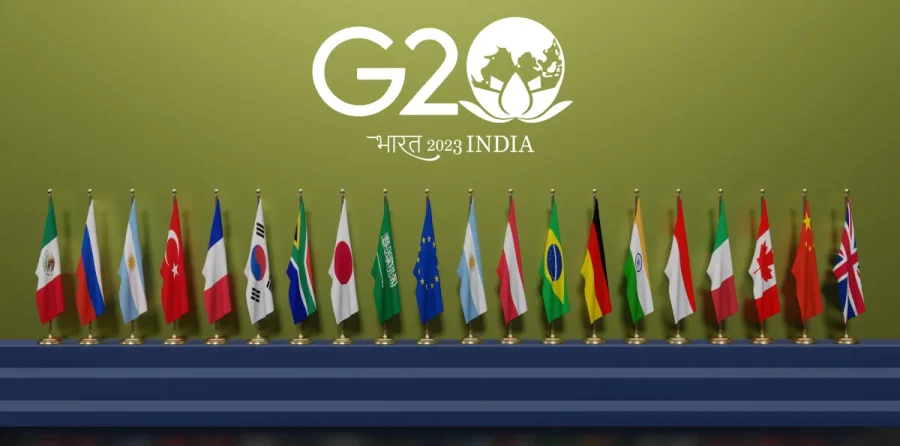This year’s host of the G20 Summit, India is preparing meetings throughout the country. However, the Indian government has decided to take this opportunity to legitimize its settler-colonial occupation of Kashmir — by holding one such meeting in the occupied territory. India is set to host a meeting for the tourism working group in Srinagar in late May (22–24) as part of the G20 summit. Over 100 inter-national delegates are slated to participate.
The G20, or Group of Twenty, is an international forum that brings together the world’s major economies, including the United States, United Kingdom, China, Turkey, and the European Union. It was established in 1999 to promote global economic cooperation and decision-making, and has since expanded its scope to include other issues such as climate change, energy, and development. The G20 consists of 19 countries and the EU, representing about two-thirds of the world’s population, 80% of global GDP, and 75% of international trade.
Major international events cannot be held in occupied territories. India’s hosting of the G20 meeting in Kashmir is a flagrant attempt to legitimize its occupation of the region and project a false image of normalcy and development. It is also a disregard for the human rights violations and suffering of the Kashmiri people, who have been subjected to repression, violence, and impunity for decades. Pakistan has strongly protested against the move, calling it a violation of international law and the UN Security Council resolutions on Kashmir. Indonesia, which is also a member of the G20, is considering whether to attend the meeting in light of Pakistan’s protest — but have yet to make a decision. Kashmiri activists and civil society groups have also called for a boycott of the meeting, arguing that it would only serve to whitewash India’s crimes and enable its impunity.
What we are witnessing is India’s attempts to depict Kashmir as a non-issue on the international stage. To showcase that in the wake of the abrogation of Article 370, all is well in Kashmir. This of course could not be further from the truth. Kashmiri human rights activists, academics, and journalists are being targeted in increasing numbers, some facing charges of terrorism. All this is accomplished by India in an effort to silence the Kashmiri voices that portray the true realities of the occupation. The Indian regime has steadily and stealthily embarked on a mission to normalize their occupation of the land — which has been subject to a massive land-grab as of late. India’s annexation of Kashmir is illegal and the hosting of this summit in Srinagar is simply a move to seek international consensus for it.
The G20 meeting in Kashmir is not the first international event to be held in the region. In 2017, India hosted a high-profile investors’ summit in Srinagar — the Global Investors Summit — which was attended by several foreign dignitaries and business leaders. However, the summit was marred by protests and clashes, and did not result in any significant investments or development in the region. All mentions of this summit have since been scrubbed from Indian media and government web-sites — due to their clear failure. Similarly, the G20 meeting is unlikely to bring any tangible benefits to the Kashmiri people, who continue to suffer from the effects India’s settler-colonial project.
Meanwhile, the Indian government has taken active steps to project the image of peace. In addition to increased arrests and detentions before the G20, there have also been reports of the government engaging in a “beautification” campaign, cleaning up and decorating certain parts of the city of Srinagar in an effort to present a more positive image to international visitors. Laborers have been tasked to execute these beautification projects day and night at an “industrial scale.” This has raised concerns among some activists and residents, who argue that the government is prioritizing appearances over addressing the region’s underlying issues. The delegates will also be taken on a sight-seeing tour, again to use tourism to normalize the occupation.
The decision to host the G20 meeting in Kashmir also raises questions about the role and relevance of the G20 in addressing global challenges and promoting sustainable and equitable development. The G20 has been criticized for being exclusive, undemocratic, and elitist, and for prioritizing the interests of the rich and powerful countries over those of the poor and marginalized. The G20 has also been accused of failing to address key issues such as inequality, poverty, human rights, and climate change, and of exacerbating them through its neoliberal policies and deregulation. These accusations would prove to be true should the meeting in Srinagar take place. The decision to hold the G20 in Kashmir is not only insensitive to the plight of the Kashmiri people but also undermines the credibility of the G20 as a platform for global economic cooperation. It sends a message that the G20 is willing to overlook human rights abuses and violations of international law in pursuit of economic interests.
It is important to note that the G20 comprises some of the most powerful and influential economies in the world, and its decisions have a significant impact on global economic policies. By holding the summit in a disputed territory like Kashmir, the G20 risks legitimizing India’s illegal occupation and extending the suffering of the Kashmiri people. It is essential that the international community takes a stand against this decision to hold this meeting in Kashmir. India must be held accountable for their illegal occupation of Kashmiri land, which they have no right to use to advance their settler-colonial agenda.
[—Courtesy : Stand With Kashmir.Org]










